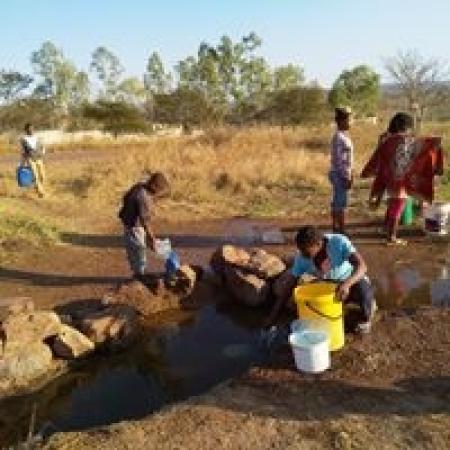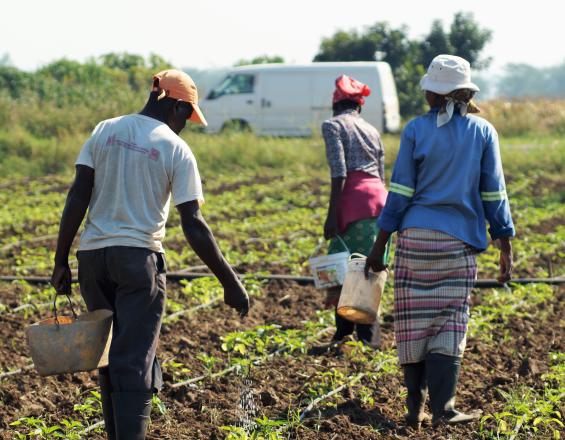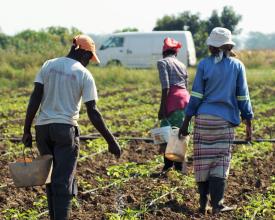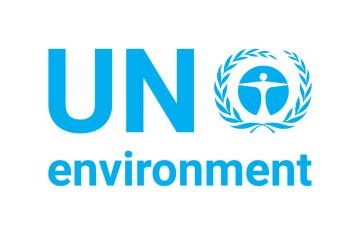
Engaging business on safety and environmental care in Mozambique

In Mozambique, chemical companies distribute pesticides with safety information written in English instead of the local languages. This is putting users at risk, particularly women and children. Alarmed by seeing women spraying pesticides while carrying babies on their backs and using chemical containers to collect water, staff of the Africa Foundation for Sustainable Development (AFSD) took action.
They are working with the business community, the Ministry of Environment, the Global Environment Facility, WWF and other stakeholders to ensure that appropriate safety information is provided. They also promote natural alternatives to pesticides and develop chemical disposal facilities.
These efforts form part of Mozambique’s national plan to implement the Stockholm Convention on Persistent Organic Pollutants (POPs) while also contributing to national initiatives to achieve food security, reduce poverty and safeguard the environment. The work focuses on a region in southern Mozambique.
Context
Challenges addressed
- Communities in Namaacha and Macaneta districts have long been using numerous industrial, toxic chemicals through lack of awareness of the dangers, partly due to low literacy levels.
- As in most impoverished communities, very few women have regular employment, their rights are often violated and they have low self-confidence. This is linked to further challenges such as reduced maternal health and increased child mortality.
- Only 6% of households have access to electricity and education.
- Unemployment rates are as high as 40% in some communities and HIV/AIDS is prevalent.
- There is limited information on the use of POPs. It is common to see street vendors selling chemicals with no safety precautions or information.
Location
Process
Summary of the process
Communications, engagement and collaboration are essential foundations for this project and work together to ensure the buy-in of the many stakeholders, build trust and develop solutions that are practical and sustainable.
Project partners have been working together over the last two years to resolve conflicts, provide solutions and chart the way forward. As a result, a solid community structure and reporting lines have been established, an action plan has been developed and the allocation of funds decided.
All problems are being tackled in conjunction with community leaders and businesses with the consultation of government stakeholders as required.
Building Blocks
Communication and training
Communications programmes have a proven record in bringing about behaviour change in health and environmental projects with examples found in fields such as family planning, nutrition, maternal and child health, HIV/AIDs and sexually transmitted diseases. A well-conceived communications programme for the phase-out and avoidance of POPs can be similarly successful.
As part of AFSD’s strategy, a group of more than 100 farmers and others (mainly women and young people) were selected to take part in a workshop to raise awareness about the safe use of chemicals and the impacts of chemicals on health and the environment. A ‘train the trainer’ approach is being used to help maximise outreach potential among the communities.
Enabling factors
The importance of communicating and engaging stakeholders and the general public is recognised by the Stockholm Convention. It states that Parties should consult their national stakeholders, including women’s groups and groups involved in children’s health to facilitate the development, implementation and updating of national plans. The convention also sets out a more detailed set of goals involving information dissemination, public participation, training, education and public awareness. This provides a framework for national and local action.
Lesson learned
The project has highlighted the need for action on several fronts including:
- Develop a communications strategy and dialogue at a national level to include disseminating information regarding legally binding instruments including the Stockholm Convention and National Implementation Plan;
- Gain institutional technical assistance and knowledge on best practices for managing POPS;
- Shift the focus from toxic pollutants to organic solutions; conserve and manage seed resources.
- Provide appropriate training material tailored to Mozambique’s needs and circumstances;
- Develop chemicals inventories together with the suppliers;
- Develop a full proposition for a sustainable food production and consumption model across the value chain;
- Understand the benefits of limiting the use of chemicals and POPS, removing barriers, and collaborating among resource users;
- Increase awareness about climate change and resilient crops (such as cassava roots) and promote the value chain.
Target group engagement
The two target groups for this project are women and youth both of which suffer high unemployment. Many of the young people are bored and some show antisocial behaviour. But AFSD believes there is potential to harness and combine the zeal of youth and the wisdom of women in the community. Women are being empowered to take part in decision making and become economically active – some are becoming entrepreneurs.
Enabling factors
As women and young people gain employment, they can help raise the quality of life of their families and extend their support beyond their immediate families to the community as a whole.
Food security or sovereignty is the focus of several social development initiatives in Mozambique. AFSD is working with schools, private businesses or sector and local communities to create incentives for the local people to use the best practices in managing natural resources.
Lesson learned
Studies carried out have revealed useful information that can help guide activities towards sustainable food production and consumption.
- There has been a marked increase in women’s involvement in the agriculture sector in Mozambique. More women are active in agriculture than men (96% of economically active women as opposed to 67% of economically active men).
- A significant number of women are engaged in intensive horticultural production on small hand-watered plots around urban areas.
- There are wide variations in farm conditions and production strategies. The family sector has been most affected by migration, the disruption of markets, lack of basic services, and destabilisation of the rural economy.
- Private commercial farms contribute 25% of marketed production. These include capital intensive farms of less than 50 hectares supplying the urban market wide a range of products.
- The third major category of farmers includes joint venture farms and state farms of up to 40,000 hectares.
- The agricultural sector is relatively stable with potential income opportunities.
Collaboration
AFSD has been collaborating with many partners in Southern Africa and at the international level testing and implementing frameworks and strategies aimed at public understanding of the socio-economic and environmental consequences of POPS if not well managed. Innovative new approaches are needed to strengthen Mozambique’s implementation of the Stockholm Convention in a sustainable and integrated way.
Enabling factors
- A desire by AFSD and partners to combine their expertise, knowledge, local and international networks and resources to enhance the sustainable delivery and impact of initiatives at the community level, with special attention to the elderly, women, disabled and unemployed youth.
- The initiative is guided by the Paris Agreement, the Sustainable Development Goals, the GEF Strategy and the National Development Plans (NDPs) of partners’ respective countries.
Lesson learned
Experience so far has shown the importance of:
- GEF Extended Constituency Workshops facilitating the process of building, structuring and strengthening the regional network;
- A network of professionals that collaborate and support each other;
- A vibrant WhatsApp group that acts as a ‘live’ communication channel across the region and a free flow of knowledge via several platforms such as Skype and DropBox;
- Awareness and exchange of funding opportunities;
- Where appropriate, collaboration to compile and submit regional proposals;
- Support for delegates attending local, regional and international conferences and events, with a view to strengthening capacity in the region.
The need to develop a communication strategy at both national and regional level.
Impacts
- Training communities on the safe use of pesticides and engaging relevant stakeholders including companies to help source new, safer alternatives to toxic pesticides.
- A 15% reduction in the use of toxic chemical pollutants in vulnerable communities.
- Creation of a pilot community farming projecting Mafuiane and Mahelane communities in Namaacha district to test natural fertilisers for growing organic plants while improving soil quality.
- Increased awareness about the use of chemical pesticides and shared experience among stakeholders on the use of bio pesticides to help reduce the use of POPs.
- Empowerment of women to take part in decisions, gain control of their lives, find employment and help improve the well-being of their communities.
- Creation of a community-run waste management centre and ‘food lab’ to promote cassava production and other products such as ethanol as an income source. Other centres are planned.
- Building a community spirit and a willingness among groups to work together on joint projects.
- Raised awareness of the importance and benefits of environmental sustainability and the need to stop harmful practices.
- Generation of more small businesses through training and encouragement.
Beneficiaries
Local communities, particularly women and children, biodiversity and ecosystems
Sustainable Development Goals
Story

To help transform Mozambique’s agricultural system into a more sustainable model, AFSD and partners believe farmers should have the right to food sovereignty. The term food sovereignty, coined by members of Via Campesina in 1996,asserts that the people who produce, distribute, and consume food should control the mechanisms and policies of food production and distribution, rather than the corporations and market institutions they believe dominate the global food system. It also encompasses the right of people to healthy and culturally appropriate food and their right to define their own food and agriculture systems.
Achieving food sovereignty involves having control of natural resources particularly land, water and seeds, as well as access to electricity. In Mozambique, biodiversity and ecosystems are being lost or contaminated as a result of the current production and consumption model and the misuse of pesticides and other chemicals. There is a need for better information provision; planning and provision of services that meet the needs of local producers and communities; decentralisation and capacity building related to food and public health services; creation of urban market gardens; and the development of consumer groups or cooperatives that promote ecologically friendly food production.
These are some of the measures that AFSD and partners are promoting. They want to put cooperatives or women’s agricultural groups in direct contact with consumers, establish relationships and solidarity between rural and city dwellers, strengthen the social fabric of communities, and create alternative food production models.
AFSD’s Thelma Munhequete believes there is great potential for positive change. “We have alternatives and everything depends on us if we could only change our behaviour and consciousness in the interests of public health,” she says.




